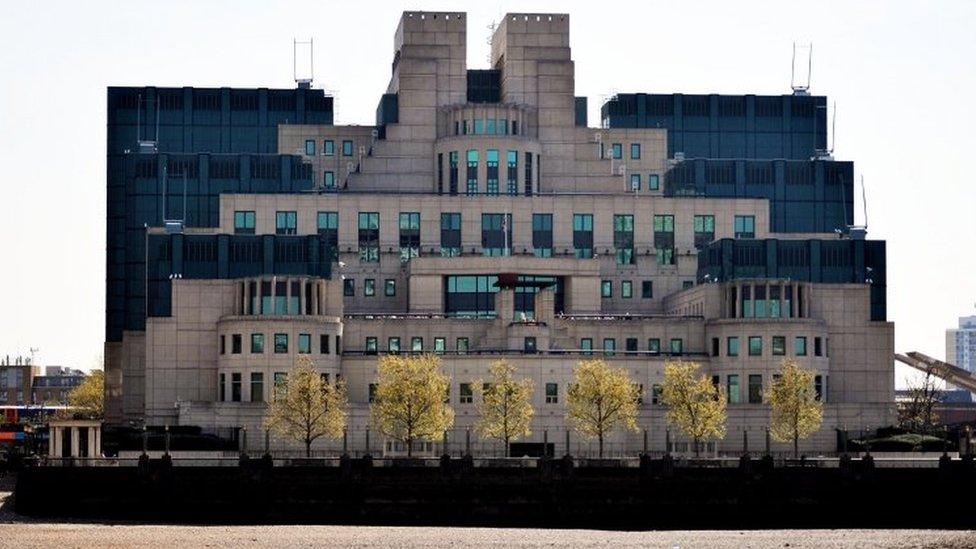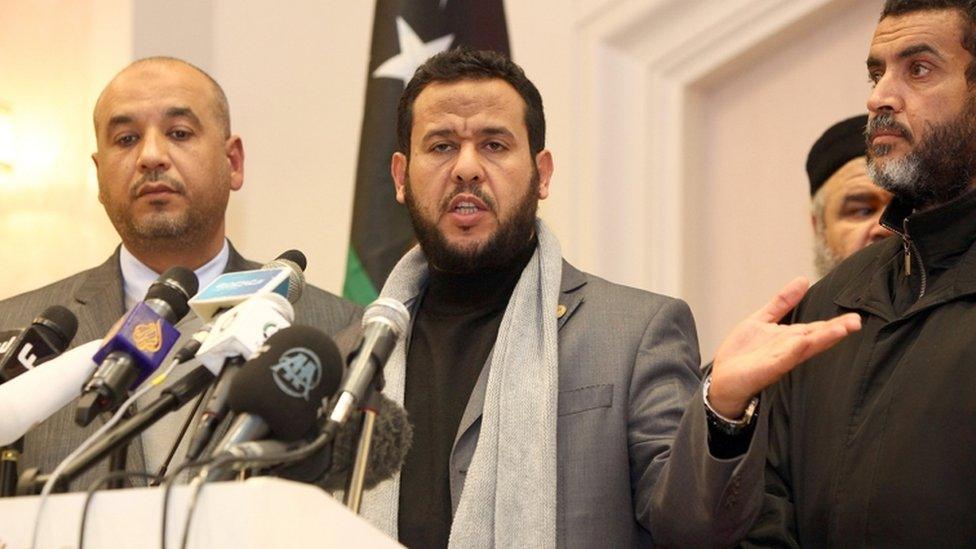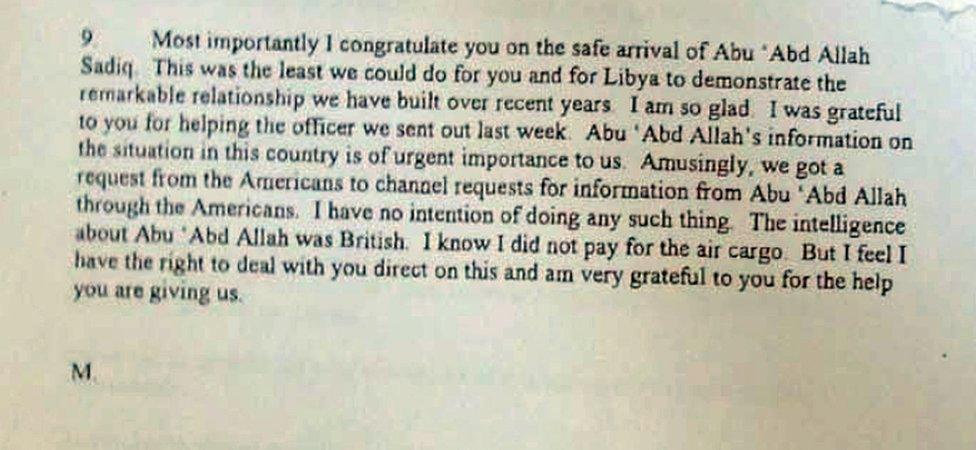Q&A: UK rendition allegations
- Published

MI6: Allegations officials helped organised rendition of Libyan dissident
The UK government has apologised to former Libyan dissident Abdul Hakim Belhaj and his wife Fatima Boudchar who were abducted with assistance from Britain's security services.
The couple say an MI6 tip-off helped the US kidnap them in Thailand from where they were transferred to Libya and Mr Belhaj was tortured.
Britain's unprecedented apology in the Belhaj case comes after allegations of rendition and torture relating to UK security services. Here is the background to the claims.
What is the key allegation that has been levelled at the British security services?
Collusion in ill-treatment and torture. In the aftermath of 9/11, the US and others invaded Afghanistan in an attempt to crush al-Qaeda. The British government was among those aiding the US mission. Some of the individuals seized by the Americans - or sometimes by the security forces of other countries - had connections to the UK.
The UK's two security agencies, MI5 and MI6, were battling to grasp the extent of the threat posed by al-Qaeda and knew some detainees held abroad had the key to plots at home. That meant British officers needed to interview anyone who had a connection to the UK or alternatively to gather information from foreign security agencies interrogating detainees.
So what's that to do with allegations of collusion?
In the years that followed, it emerged that some of the detainees held in foreign prisons had been abused or tortured. The question was whether British officials aided and abetted that abuse or, at the least, had been told what was going on and did nothing to intervene. If the UK did not intervene, was that a crime?
The most well-known case was Binyam Mohamed.
Mr Mohamed, a resident of the UK, was detained in Pakistan in 2002 and handed over to US authorities. The then terrorism suspect was moved to Morocco and Afghanistan before being detained at Guantanamo Bay. Mr Mohamed says that he was abused in Pakistan and tortured in Morocco. When he was finally released from Guantanamo Bay to returned to the UK. He was never charged with a crime.
The Court of Appeal in London eventually ordered the release of information, external showing the US had indeed told the UK that the detainee had been subjected to "cruel, inhuman and degrading treatment".
Did the UK get directly involved in arrangements to hand suspects over to governments known to torture?
In the legal jargon, this is called "rendition" but, if it's illegal, it amounts to abduction. Arguably the most serious case is that of Libyan Abdul Hakim Belhaj and his wife, Fatima Boudchar. Mr Belhaj was a leader of an armed Islamist group dedicated to the overthrow of Colonel Gaddafi.

Abdul Hakim Belhaj (centre): Prime Minister Theresa May said he and wife Fatima Boudchar had suffered "appalling treatment"
When the dictator crushed the group in the late 1990s, its leadership scattered - some of them throwing their lot in with al-Qaeda, the Taliban or other jihadist organisations.
The UK government has apologised to Mr Belhaj and his wife and accepted the couple's account, which says MI6 provided key intelligence in 2004 on his movements which ultimately led to his capture and rendition by the US to Libya.
Mr Belhaj spent six years in prison and was tortured. His then pregnant wife was only released days before she gave birth.
The links to the UK government emerged following Gaddafi's 2011 fall after investigators from Human Rights Watch, external raided his intelligence HQ and discovered documents that pointed the finger at British officials.

Document uncovered in Libya: Links London to rendition
What does the law say about torture?
Torture has been banned for centuries under English law, a position backed by international convention. The UK also has a long-standing prohibition on lesser forms of abuse, relating to interrogation practices that were outlawed during the Troubles in Northern Ireland.
Did British officials torture or abuse anyone?
There are no allegations that British officials broke the law in this way. The allegation has always been that some either turned a blind eye or did not do enough to stop foreign security agencies abusing detainees.
So were they complicit?
In a letter read out in the Commons relating to the Belhaj case, Theresa May said UK actions had contributed to the couple's capture and that the government had "shared information" about them with "international partners".
While the government's apology maintains a denial of legal liability, the settlement leaves questions unanswered about how much others in government were involved in what happened.
The prime minister said: "Later, during your [Mr Belhaj's] detention in Libya, we sought information about and from you. We wrongly missed opportunities to alleviate your plight: this should not have happened."
In another case, the UK in 2012 agreed to pay £2.2m to Libyan dissident, Sami al-Saadi and his family who said MI6 was involved in their illegal rendition.
And in another string of cases brought by British men held at Guantanamo Bay, the government settled for millions of pounds. That meant their cases were never fully examined.
Ministers promised to hold a major public inquiry into the allegations - but they scrapped that after detectives began investigating the allegations made by Abdul Hakim Belhaj and another Libyan dissident.
Separately, Parliament passed a law allowing courts to hold secret sessions to examine evidence of wrongdoing involving MI5 and MI6. That means the government can now, if it so wishes, defend its position in private, without having to reveal in public what, if anything, happened.
Did the inquiry reach any findings before it was closed down?
Sir Peter Gibson, the retired judge chairing the inquiry, said in his closing report that there was indeed evidence that the UK "may have been inappropriately involved in some renditions" and this "very serious matter" needed to be properly investigated.
Parliament's Intelligence and Security Committee is continuing that work in secret.
What happened to the police investigation ?
After four years - and reportedly examining 28,000 pages of documents - the CPS decided last June there was insufficient evidence to prosecute anyone from MI6 in relation to the Libya claims. Prosecutors had previously ruled out prosecuting anyone in relation to the ill-treatment of Binyam Mohamed.